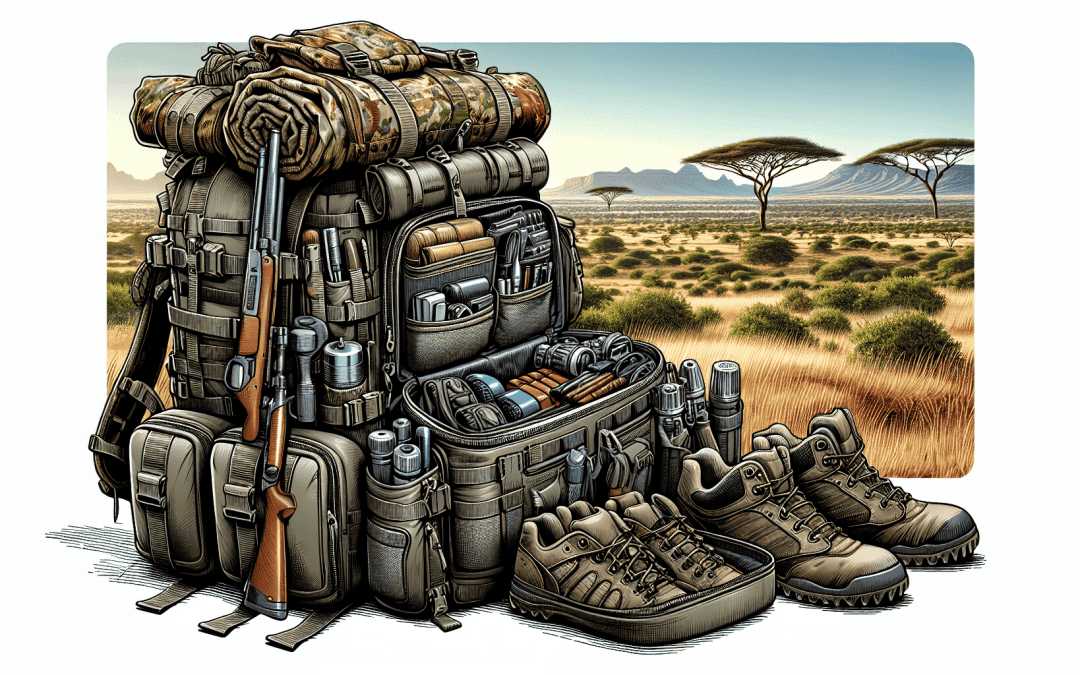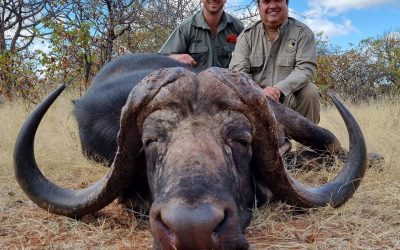So you’ve decided to embark on a hunting adventure in Africa, but you’re concerned about how to ensure your safety throughout the journey. With the continent’s diverse wildlife and unique landscapes, it’s important to be well-prepared and informed before setting foot on African soil. Thankfully, there are several key measures you can take to prioritize your safety during this thrilling experience. From researching your hunting destination to working with reputable guides, this article will provide you with valuable insights on how to protect yourself and make the most of your hunting expedition in Africa.
Research and Plan
When embarking on a hunting trip in Africa, it’s crucial to thoroughly research and plan ahead to ensure your safety. Here are some key steps to take in this stage:
Know the Local Laws and Regulations
Before heading out to hunt in Africa, familiarize yourself with the local laws and regulations pertaining to hunting. Each country has its own specific rules and permits required, and it’s essential to abide by them to avoid legal troubles. This may involve obtaining hunting licenses, adhering to bag limits, and knowing which species are protected.
Research the Area and Wildlife
Once you’ve decided on a specific hunting destination, take the time to research the area and its wildlife. Get to know the territory, the specific habitats of the animals you plan to hunt, and any potential dangers that may be present. Understanding the behavior and patterns of the wildlife will go a long way in ensuring your safety during the hunt.
Hire an Experienced Guide
To enhance your safety while hunting in Africa, it’s highly recommended to hire an experienced and reputable guide. A knowledgeable guide will not only navigate the terrain effectively but will also have invaluable insights into animal behavior and local customs. They can provide guidance on hunting techniques, help you locate the best hunting spots, and ensure your overall safety throughout the trip.
Prepare Properly
Proper preparation is key to a successful and safe hunting experience in Africa. Take the following steps to ensure you’re adequately prepared:
Get the Necessary Vaccinations
Before traveling to Africa, consult with a healthcare professional to determine which vaccinations are required or recommended for the area you’ll be hunting in. Vaccines such as hepatitis A and B, typhoid, and yellow fever may be necessary. Getting vaccinated will not only protect your health but also minimize the risk of contracting any infectious diseases.
Pack Adequate Clothing and Gear
Africa’s diverse climates and terrains demand appropriate clothing and gear. Consider the weather conditions during your trip and pack accordingly. Lightweight and breathable clothing, sturdy boots, a wide-brimmed hat, and camouflage gear are generally recommended. Additionally, ensure you have quality hunting equipment, such as rifles, scopes, and ammunition, specifically suited for the species you’ll be hunting.
Carry Sufficient Medications
When venturing into remote hunting areas, it’s essential to have a well-stocked medical kit. Pack necessary medications for common ailments, such as pain relievers, antihistamines, and anti-diarrheal tablets. Don’t forget any prescription medications you require and be sure to bring along insect repellent, sunscreen, and a first-aid manual to handle minor injuries and illnesses.
Choose a Reputable Outfitter
Partnering with a reputable outfitter or hunting guide service is vital to ensuring your safety during your hunting adventure. Consider the following factors when selecting an outfitter:
Check for Reviews and Recommendations
Before committing to an outfitter, research their reputation and gather as much information as possible. Read reviews, testimonials, and recommendations from previous clients to gauge their level of customer satisfaction and the quality of their services. This will help ensure you choose an outfitter with a proven track record of prioritizing safety and providing exceptional experiences.
Inquire About Safety Measures
While researching outfitters, inquire about the safety measures they have in place. Ask about their emergency protocols, communication systems, and the training and certification of their guides. A reputable outfitter will be transparent in discussing their safety practices and will prioritize measures that minimize risks and ensure the well-being of their clients.
Ensure Proper Communication
Good communication with your outfitter is crucial throughout the hunting trip. Make sure you have a clear understanding of their policies and expectations, as well as your own responsibilities as a client. Share any specific safety concerns or medical conditions you may have, and ensure they acknowledge and accommodate these needs. Establishing open and frequent lines of communication will contribute to a safer and more enjoyable experience overall.
Practice Safe Firearm Handling
When hunting in Africa, it’s essential to prioritize safe firearm handling to prevent accidents and ensure the well-being of everyone involved. Follow these guidelines to ensure your safety and the safety of those around you:
Obtain the Required Permits and Licenses
Before traveling, ensure that you have obtained all the necessary permits and licenses for possessing and using firearms in the country you’ll be hunting in. Complying with local laws and regulations is critical to avoiding legal complications and promoting a safe hunting environment.
Complete Firearms Safety Training
Proper firearms safety training is indispensable for anyone using firearms during a hunting trip. Familiarize yourself with the basics of firearm safety, including proper handling, loading, unloading, and storage practices. Be knowledgeable about your specific firearm’s features and operation to minimize the risk of accidents.
Always keep the muzzle pointed in a safe direction
An essential rule of safe firearm handling is to always keep the muzzle pointed in a safe direction. This means keeping the firearm pointed away from people or any objects you don’t intend to shoot. Accidental discharges can have devastating consequences, so remain vigilant and conscious of your firearm’s direction at all times.
Ensure Accommodation Safety
After a long day of hunting, it’s crucial to ensure that you have a safe and secure place to rest and recharge. Consider the following measures to promote accommodation safety:
Stay in Secure Lodges or Camps
When selecting lodging options, opt for secure lodges or camps that prioritize the safety of their guests. Research the accommodations beforehand and choose reputable establishments that have proper security measures in place, such as secure entrances, well-lit areas, and trustworthy staff.
Keep Your Valuables Safe
While staying at accommodations, take precautions to keep your valuables safe. Use the provided safes or lockboxes to store any cash, jewelry, passports, or other valuable items. Avoid leaving valuables unattended or displaying them in plain sight, as this may attract unwanted attention.
Follow Instructions from Staff
Listen to and follow any instructions or guidelines provided by the staff of your accommodations regarding safety measures. They are familiar with the local area and can provide valuable insights into potential risks or precautions to take. Be respectful and cooperative to ensure a safe and pleasant stay.
Know and Respect the Wildlife
Respecting and understanding the wildlife you’ll encounter during your hunting expedition is vital to your safety. Consider the following guidelines:
Understand Animal Behavior
Before embarking on your hunting trip, educate yourself about the behavior and habits of the animals you’ll encounter. Recognizing signs of aggression or distress, as well as understanding their natural habitats, will help you anticipate and avoid potentially dangerous situations.
Maintain a Safe Distance
When observing or pursuing wildlife, maintain a safe distance to minimize the risk of startling or provoking animals. Respect their personal space and avoid approaching them closely. Remember that you are a guest in their natural habitat and should seek to observe them without disrupting their behavior or risking your safety.
Never Approach Dangerous Animals
It’s important to firmly grasp the distinction between observing wildlife and approaching dangerous animals. Stay far away from animals known to be aggressive or potentially harmful, such as lions, elephants, or hippos. These animals should only be approached under the guidance of a professional and experienced guide.
Stay Alert and Vigilant
Remaining alert and vigilant throughout your hunting trip is crucial for your safety. Keep the following points in mind:
Be Aware of Your Surroundings
Always be conscious of your surroundings and stay vigilant to any potential risks or hazards. Pay attention to changes in the environment, weather conditions, and any signs of animal activity. Being aware will allow you to react quickly and appropriately to ensure your safety.
Watch Out for Snakes and Insects
Africa is home to various venomous snakes and insects. To minimize the risk of encounters, be cautious when walking in tall grasses, dense vegetation, or rocky areas. Wear appropriate footwear, such as sturdy boots, and consider using insect repellent to protect yourself from mosquito-borne diseases.
Avoid Isolated Areas
When venturing into unfamiliar territories, avoid isolated or secluded areas. Stick to well-traveled paths and hunting grounds and inform your guide or fellow hunters of your intended route. The presence of others can provide an added layer of security, deterring potential threats and ensuring timely assistance in case of emergencies.
Travel in a Group
Hunting in Africa is best done in a group setting rather than solo trips. Consider the following reasons why traveling in a group enhances your safety:
Avoid Solo Hunting Trips
Hunting alone in Africa can be risky and potentially dangerous. Having companions decreases the chances of accidents or emergencies going unnoticed. It also provides added support, assistance, and a wider range of skills and experience to draw on should any unexpected situations arise.
Stay Close to Your Guide and Fellow Hunters
During the hunt, maintain close proximity to your guide and fellow hunters. This allows for effective communication, coordination, and mutual assistance if needed. Your guide’s knowledge of the area and animals, combined with the presence of others, significantly enhances everyone’s safety.
Have a Communication Plan
Establishing a clear and effective communication plan with your group is essential for safety. Agree on specific signals, gestures, or verbal cues to communicate important information efficiently. This ensures all members are aware of any changes or potential risks and can act accordingly to prevent accidents or mishaps.
Practice Self-Care
Taking care of yourself while on a hunting trip in Africa is crucial for maintaining your safety and well-being. Focus on these aspects of self-care:
Stay Hydrated and Well-Rested
The African climate can be unforgiving, particularly during hunting seasons. Stay hydrated by drinking plenty of water throughout the day, even if you don’t feel particularly thirsty. Additionally, make sure to get enough rest each night to recharge your energy and maintain mental and physical alertness.
Take Breaks and Pace Yourself
Hunting can be physically demanding, and pushing yourself beyond your limits can lead to exhaustion or injuries. Take regular breaks to rest, rehydrate, and refuel. Pace yourself according to your physical condition and the demands of the hunt, allowing your body to recover as needed.
Listen to Your Body
Pay attention to any signs of fatigue, pain, or discomfort your body may be signaling. Ignoring these signs can lead to accidents or jeopardize your health. If you experience any unusual symptoms or feel unwell, communicate your concerns to your guide or fellow hunters so that appropriate actions can be taken.
Emergency Preparedness
While no one plans for emergencies, being prepared for them is paramount. Take the following steps to ensure you’re ready for unexpected situations:
Carry a First Aid Kit
A well-stocked first aid kit is an essential item to have on any hunting trip. Pack it with essential medical supplies, such as bandages, antiseptic ointment, painkillers, and basic wound care items. Familiarize yourself with the contents and how to use them effectively before your trip.
Know Basic First Aid Techniques
Having a first aid kit is not enough; you must also be prepared to use its contents effectively. Consider taking a basic first aid or wilderness first aid course before your trip. These courses provide valuable knowledge on how to handle various injuries and medical emergencies in remote locations.
Have Emergency Contact Information
Before embarking on your hunting trip, ensure that you have a list of emergency contact numbers readily available. This should include local emergency services, your outfitter’s contact information, and the nearest medical facilities. Having this information accessible will expedite the response to any emergencies that may arise.
By following these comprehensive guidelines and being mindful of your safety at all times, you are well on your way to ensuring a safe and memorable hunting experience in Africa. Remember, preparation, knowledge, and responsible hunting practices are the keys to an adventure that is both enjoyable and secure. Take the necessary precautions, respect the wildlife and regulations, and make memories that will last a lifetime. Happy hunting!











